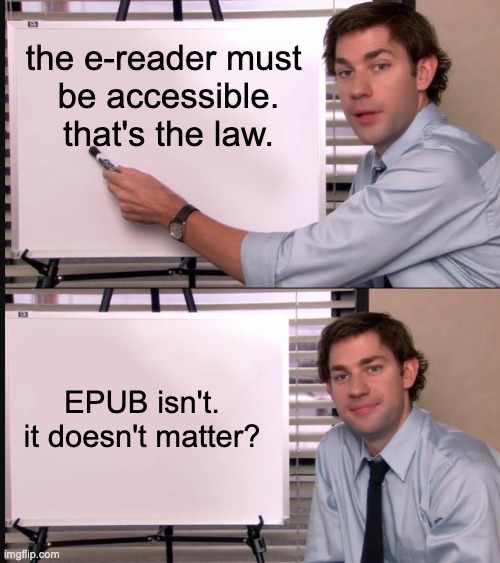Navigating EPUB Accessibility Requirements

Introduction:
When it comes to displaying digital publications, accessibility is a crucial concern. When creating a reading system that consumes EPUB (Electronic Publication), the standardized format for digital books, we must meet certain accessibility requirements (achieving WCAG 2.1 AA compliance). The EPUB that is part of the user's journey through the reading system should, in my opinion, be just as accessible.
Every creator/operator of a reading system should ensure that these files meet accessibility requirements. Without this, how can one guarantee the compatibility of the reading system with an EPUB? What happens if an EPUB does not adhere to the recommendations, could it cause malfunctions in the reading system and accessibility?
In this article, I will examine the facts I have found in the W3C recommendations. I will also share my thoughts and questions (I always have many) as I make discoveries and write this post.
For now, I have drawn no conclusions, and I feel lost with more questions than ever. Good luck if you were looking for answers.
🤸♂️ Just the facts:
EPUB accessibility standards are well-documented by the W3C. Publishers are encouraged (note well) to generate EPUB files that comply with the requirements outlined in EPUB Accessibility 1.0.
May 2023, a new version of the standards: Although the recommended version is EPUB Accessibility 1.1, it's worth noting that the compliance version remains 1.0 (submitted in January 2017). However, slight modifications can make compliance with the recommendations of version 1.1.
The W3C has published a document explaining techniques for generating/creating accessible EPUBs, which is quite handy. However, it should be noted that it is rather lengthy. These techniques do not cover techniques directly related to WCAG but rather the specifics of the EPUB format, such as EPUB metadata, navigation, audio, and video files.
As we saw in the previous point, EPUB files must also comply with Web Content Accessibility Guidelines (WCAG).
Once you have written down these four points, you realize that something isn't quite right.
🚬 My Anxious Thoughts:
Ensuring the accessibility of EPUBs involves two key areas:
- The creation/production of accessible EPUBs; begins during the layout work and extends to the export process.
- The consumption/reading of these EPUBs, depends on the reading system's ability to display them correctly. The reading system includes additional features that enhance the reading experience of EPUBs within the reading system.
EPUB accessibility standards are not explicitly mandated, but they are widely recognized as best practices to follow. However, the European legislative act on accessibility covers (among other things) products and services related to access to audiovisual media services, including e-books. Consequently, publishers and streaming companies of books are affected by the European legislative act. Remember that the Convention on the Rights of Persons with Disabilities (CRPD) emphasizes equal access to books as a fundamental right.
As we can see with the European legislative act on accessibility (EU Accessibility Act), the legal requirements are there. According to European law on accessibility, the reading system must comply with WCAG 2.1 AA. The same applies to EPUBs intended for readers, which must also comply with WCAG 2.1 guidelines.
However, it's important to note that publishers are not legally obligated to follow all the recommendations, creating a paradox (or at least a grey area) between legal obligations and best practices.
😑 My Questions:
How do we distinguish bugs? Can we reliably differentiate between a bug originating from the EPUB file and a bug resulting from non-compliant EPUBs on the reader's system?
Do publishers have an obligation to comply? Can/should the requirements of the Convention on the Rights of Persons with Disabilities (CRPD) compel publishers to follow W3C recommendations before publishing EPUBs on various platforms and apps?
Can the reading system offload its compliance responsibility to the EPUB (as with a third-party service)? If an EPUB doesn't meet accessibility criteria, can the publisher be exempt from compliance requirements?
Compliance responsibility: In the journey to EPUB compliance, who bears the primary responsibility—the publisher creating the EPUB or the reading system interpreting it?
Without comment and without conclusion:
I apologize to those who have read this no-conclusion post. I haven't been able to reach conclusions/certainties yet. The idea was to assess the accessibility of EPUBs.
We have publishers who are increasingly asking us questions about these topics. While trying to answer them, I thought it would be good to put it all down here. Perhaps you have ideas or information that could be helpful to me?
Thank you for reading this conclusion-less post
If you wish to discuss this article, feel free to contact me (link opens in a new tab). I'd be happy to hear from you.